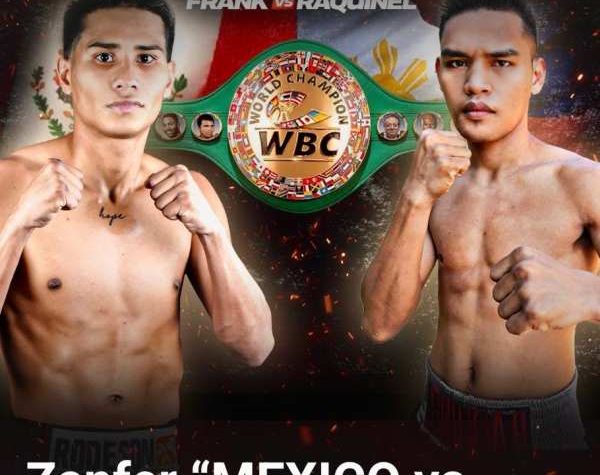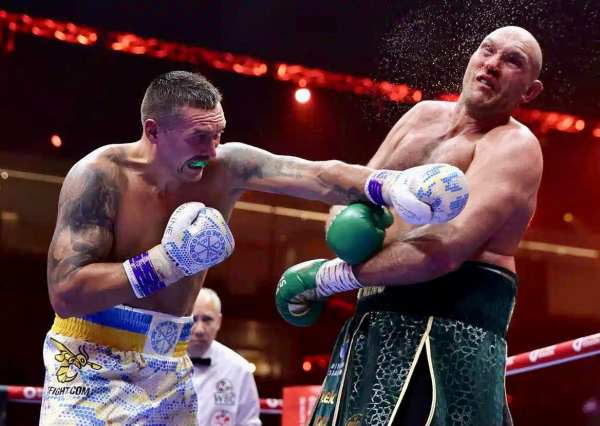
The idea of the biggest boxing star in the world facing a world champion from another combat sport has been talked about since the beginning of time, and now it may actually happen. But the irony is that as successful as the UFC is, it is doing something that no other company in the past ever agreed to do: sacrifice its top draw for a one-night payoff.
/cdn0.vox-cdn.com/uploads/chorus_image/image/53738283/102_Nate_Diaz_vs_Conor_McGregor.0.0.jpg)
Dana White’s latest revelation, that a proposed Floyd Mayweather Jr. vs. Conor McGregorfight will probably happen, besides being a quick about-face from what he was saying just days earlier, speaks more to modern technology’s ability to drive so much revenue on a singular night than anything else.
It’s been roughly 11 years since the UFC was able to hang with boxing, and eventually surpass boxing (except for rare superfights) as a consistent pay-per-view draw. From that point, the idea of a true top drawing boxer vs. top drawing UFC fighter would have always been a big one-night money grab. But there was a logical reason it would never happen, aside from when the past-his-prime James Toney faced Randy Couture. It’s the same reason that for the last 100 years similar matches with the biggest boxer of any given era against the biggest wrestling star of any given era never took place.
Playground arguments over who would win a real fight between boxing champion Jack Dempsey and wrestling champion Ed “Strangler” Lewis were common in the 1920s. Generations later, the same happened with new names, such as Muhammad Ali and Bruce Lee in the early 1970s, or Mike Tyson and Alexander Karelin in the 1990s. The arguments were destined by always be theoretical and unanswered. In reality, such a real fight could never happen.
There was always money potential for those match-ups, but there were also a couple of truisms. While people who knew little about fighting and the kids on the playground who debated those topics had the fantasy that there was some street fighter-esque mentality in the elite badasses of combat sports, those who know could tell you that in almost all cases, the winner of that type of fight is determined ahead of time by who has the power to make the rules.
In laymen’s terms, MMA is a decathlon. Boxing, wrestling, kickboxing, sambo, judo, etc. are the 100, the 1,500, the hurdles, the shot put, the pole vault, and the long jump. You can argue that the gold medal winner of the decathlon is the greatest all-around athlete in the world. But put him in with the gold medalist in any of those individual disciplines, and he gets smoked. But if you take Usain Bolt and put him in a series of different events against Ashton Eaton, aside from his specialty, he’d have no chance.
There was all kinds of money to be made from Dempsey vs. Lewis, and there were talks for years that at times it came close to happening. But at the end of the day, such a fight, even though it would have financially benefited both sides greatly for one night, never happened. Both men were big drawing cards and the feeling was that if they would lose, it would hurt their drawing power, and perhaps more importantly, it would make the public believe that the other sport has tougher guys.
Granted, if you’re a true fight fan, the idea is silly. But in those days, and even with smarter fans today, part of the perception and drawing power of big fights is the idea that these are the baddest men on the planet. Boxing fans, mostly older, want to cling to the idea that MMA is some secondary fight creation so lesser fighters have a venue where they can participate at a high level. MMA fans have their own superiority ideas that the old generation of boxing fans are outdated because in a real fight, the boxers wouldn’t have a chance against their MMA heroes.
And those who know both sports know that if such a mixed fight would happen, the winner was predetermined anyway based on the rules.
Dempsey had been around wrestlers enough to know that, in the end, he couldn’t beat a wrestler in a fight where wrestling was part of the fight. He was the bigger star. Boxing was the more lucrative sport. Lewis knew that he’d face instant destruction if he accepted a fight where he couldn’t use his wrestling techniques. If he did so, the entire business of pro wrestling would have suffered badly, even though he’d make more money on that night than he could with another wrestler.
Substitute the names, whether it was Rocky Marciano and Lou Thesz, or Ali and Bruno Sammartino, and that argument continued to play out. In one of the better kept secrets of the past 15 years, even after the UFC started, there was an attempt made to once again make that type of fight.
About 15 years ago, the camp of Lennox Lewis approached Vince McMahon with the idea of a joint promotion where he’d face a pro wrestling champion. What Lewis was thinking was unknown, probably a way to get a big money fight against a non-fighter, and get a nice payday. McMahon was interested at the time.
In 2002, McMahon had made the call to build his company around a newcomer named Brock Lesnar. McMahon’s business was huge from 1999 to 2001, but had tumbled. The Rock had left for Hollywood and injuries made Steve Austin’s days numbered. Lesnar was a great athlete, huge and physically impressive, and unlike most of the entertainers that McMahon had in his troupe, Lesnar was truly gifted as a legitimate wrestler, having won the NCAA heavyweight championship in 2000.
Lewis’ idea set the wheels in McMahon’s brain turning. While Lesnar at the time was gaining popularity in wrestling, to get him to the next level — the goal was for him to be the new generation’s Hulk Hogan — he needed an outside hook. Hogan had used the Rocky movies, Mr. T and Cyndi Lauper, where the public outside of the wrestling fandom took notice of him.
What could be bigger than the WWE champion against the world heavyweight boxing champion? Granted, the boxing heavyweight king didn’t mean nearly what it did in the era of Ali, Joe Louis or even Mike Tyson, but it was still far more important to the public than it is today.
McMahon, having been around wrestling for most of his life, figured — as most in wrestling believed — that in a mixed rules match, the boxer has about a 30-second window of opportunity before he’s taken down and it’s over.
The idea got far enough that McMahon personally contacted Marc Ratner, the current UFC Vice President of Regulatory Affairs, who at the time was the Executive Director of the Nevada Athletic Commission. He told Ratner that he wanted the fight to be in Las Vegas, and wanted to know what he needed to do to get Nevada to sanction the fight as legitimate.
Ratner told him Nevada would sanction the fight, giving it the credibility they felt it needed since the involvement of McMahon would make people think it wasn’t going to be on the level, but only as long as every fight on the show was real. McMahon had laid out plans for two fights, Lesnar vs. Lewis and Kurt Angle, one of McMahon’s other top stars at the time and a 1996 wrestling Olympic gold medalist, against Michael Moorer, a former heavyweight boxing champion.
But the idea fell apart once rules were discussed, as suddenly Lewis, who was the bigger draw, didn’t want takedowns below the waist allowed and insisted on other rules that would take away Lesnar’s weapons. Rather than take his share of the one-day payday that would have probably been huge, McMahon lost interest. Lewis later claimed there were never even talks for such a fight.
What value was it for McMahon to put one of his stars in a situation where they’d lose for just one night? And while Lesnar would have made more money for that fight than any pro wrestling match, or anything possible at that time in his life, it isn’t like he was looking at sacrificing his aura as a giant badass to the public under largely boxing rules against the best in the world in a sport he had never participated in.
Keep in mind that McMahon could have sacrificed Lesnar if Lesnar would have agreed to it, but felt it was the wrong long-term business move. Lesnar could have agreed to be sacrificed for the biggest payday he’d have ever imagined. McMahon also had the advantage that if Lesnar didn’t do well, he could just move on and create a new heir apparent. Unlike with the UFC, he controlled the narrative and there were a half-dozen guys he could have put in the Lesnar position after getting his cut of the one-night freak show…
…which makes Mayweather vs. McGregor so fascinating.
The UFC is far more profitable than 2002 WWE, which had lost $19,455,000 that year due to declining interest in pro wrestling, and far more due to a costly restaurant investment. McGregor has already broken through as a celebrity outside of his sport and the biggest drawing star the UFC has ever had. He’s not Vince McMahon trying to come up with a way for Brock Lesnar to become Hulk Hogan. McGregor already is Hulk Hogan as far as drawing power goes. And it’s not like he’s close to 40 years old, where the reality of making that kind of money is coming to an end.
Yet, where Vince McMahon nixed a deal because of the rules — the same reason every fight of this ilk in every generation never happens — this one really may happen. More fascinating is the UFC, an entity far more successful than any current boxing company, giving away the farm by having its star fight under rules where his chances of winning are just slightly better than Ashton beating Bolt in the 100.
Actually, the closest thing to this that did happen, back in 1976, was the infamous Antonio Inoki vs. Muhammad Ali match, which in Japan is often called the birth of mixed martial arts and in the U.S. became a faded memory as a bad joke.
Inoki was a pro wrestling champion, who was a trained athlete in wrestling and martial arts. He knew some submissions and could wrestle a bit, but by no means was he an elite fighter. But through manipulations, the country of Japan believed him to be the genuine article.
In the end, even though Inoki’s side were the promoters, Ali, because he was Ali, had all the power. At the last minute, rules were put in place to where Inoki’s best weapons were banned, and in theory, he had little chance. He ended up devising a strategy of laying on his back and kicking at Ali’s legs for 15 rounds. The fight was a fiasco, and when it was over, the feeling was that type of a fight could never happen again because it left people with such a bad taste.
Nonetheless, the answer as to why this one looks like it could really happen includes a few things.
First, Mayweather vs. Manny Pacquiao did 4.6 million pay-per-view buys at $100 a pop in the U.S. alone. The entire event grossed in the realm of $600 million worldwide. It showed the ceiling for revenue for “the big fight” was far higher than anyone had ever imagined. That doesn’t mean Mayweather and McGregor will do that level of money. But going in, most thought Mayweather and Pacquiao would be successful, given the high price tag, to do half of what it ended up doing. The economic incentives today are different than any other time in history.
Evidently the belief is that Mayweather vs. McGregor would generate enough money that it would be worth it for the UFC to sacrifice the long-term drawing power of a 28-year-old star who is carrying the company on his back.
Second, unlike in all previous discussions, where boxer vs. wrestler contests would have some form of mixed rules, this fight was always under Mayweather’s rules from the start. Ultimately, it’s an admission that Mayweather is not just bigger than McGregor, but bigger than the entire UFC company and the sport of mixed martial arts, even though his is the sport fading in popularity while McGregor’s is the one growing. The rules in place tell you who is calling the shots here and, no matter what others will say publicly, who is the real star.
Sure, any combat sports fan knows the result of this fight is actually almost as predetermined as a Bruce Lee movie fight scene. But to the average person on the street, the sports fan who may still think UFC fighters are unskilled street fighters who get into a cage with no rules because they weren’t good enough to be civilized and refined boxers, and for a generation of UFC fans who are sure they know better, the UFC and McGregor are selling out their entire narrative in a potentially humiliating fashion for one, admittedly gigantic, payday.
The other fascinating aspect is that in another generation, such a loss would be humiliating to the UFC and McGregor. But today, when fight fans care far more about personalities and less about wins, losses and championships, who is to say that McGregor’s mouth won’t save his drawing power after a likely public humiliation?
Who is to say that the actual truth, which Dana White will talk endlessly about after it’s over — that McGregor played somebody else’s game and nobody should take the result seriously — won’t be the post-fight narrative that more than just UFC hardcore fans will cling to? And will that new narrative keep the UFC from declining as a business and McGregor from crapping out as a giant money drawing commodity?





More News
Liu Gang, Brico Santig Join Forces
Highland’s Double Impact: August 18 at Lumpinee
Balajadia, Atencio in Action in Thailand